Rogue One: A Star Wars Story (United States, 2016)
December 13, 2016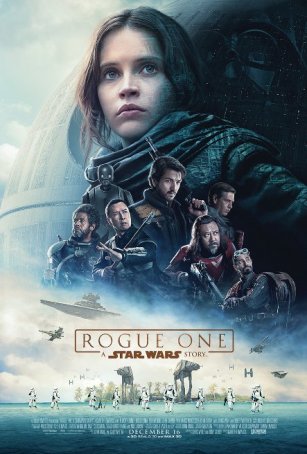
“A long time ago in a galaxy far, far away…” Perhaps those words don’t mean as much as they did a couple of decades ago but they still have the capacity to raise goose bumps. And, although Rogue One, the first so-called “Star Wars anthology” movie (a story not focused on the Skywalker family), lacks an opening crawl and the rousing musical fanfare at the beginning, it still uses “A long time ago in a galaxy far, far away…” For that reason, it doesn’t take long for us to feel like we have been transported into the milieu created by George Lucas 39 years ago. If The Force Awakens was a loving but ultimately disappointing recycling of the original Star Wars’ greatest hits, Rogue One is a more solid and better realized vision because, rather than trying to bend and twist Lucas’ universe to fit his interpretation, director Gareth Edwards (Godzilla) allows his narrative to take place “A long time ago in a galaxy far, far away…”
Edwards came to this project with a three-fold mission: make a war movie with Star Wars trappings, pay tribute to Lucas’ hexalogy, and figure out how to neatly dovetail this story into A New Hope. Using those goals as a barometer of his success, I’d give the filmmaker 2.5 out of 3. The weakest link is the war story, which is irregularly paced and at times a little too obvious. Maybe I’ve seen too many Dirty Dozen-inspired productions but this one isn’t among the strongest. With the exception of perhaps two characters, everyone else is window dressing, getting a nice scene or two with little background and less development. The battle scenes are excellently rendered and the narrative is solid but, aside from Jyn Erso (Felicity Jones) and Cassian Andor (Diego Luna), Rogue One doesn’t give us anyone to care about. It limits the emotional impact of the inevitable denouement.
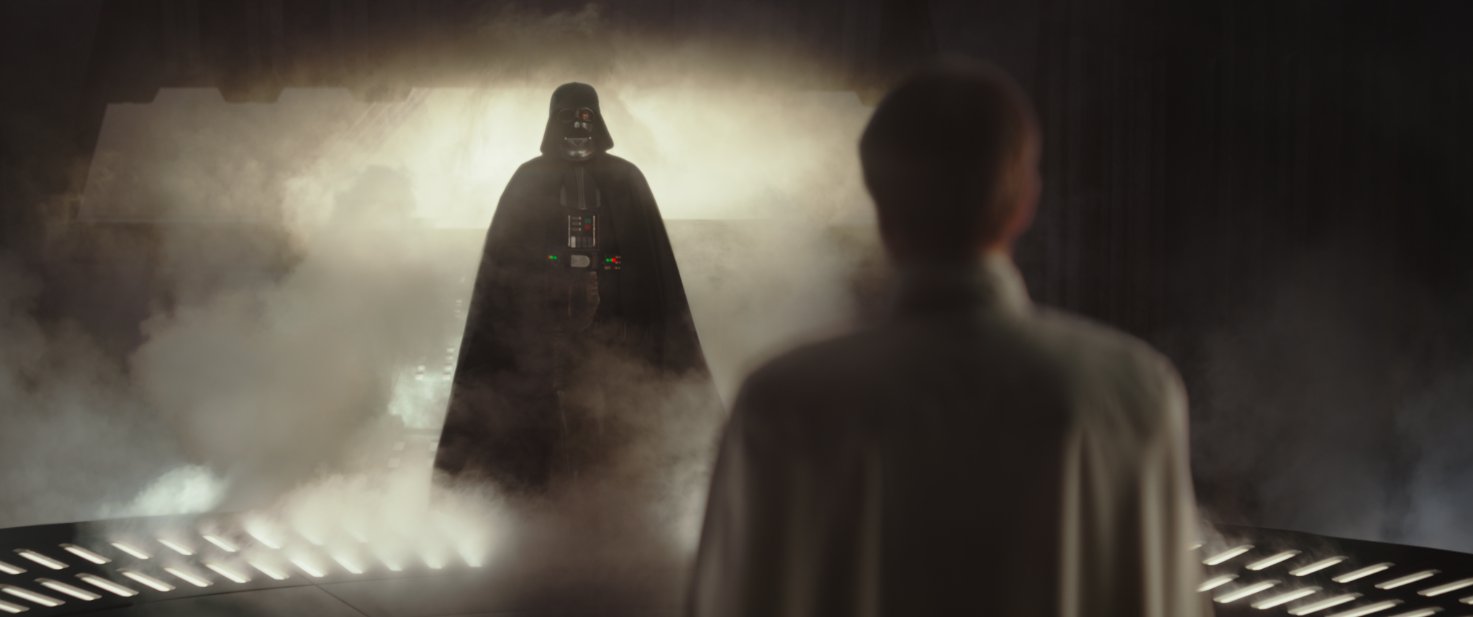 Darth Vader’s heralded return is triumphant. Vader doesn’t have a lot of screen time but he makes the most of his few scenes. With James Earl Jones once again providing the voice, Vader is as menacing as he was in A New Hope (with no Emperor hovering around him, pulling the strings) and is given an opportunity to show why he was so feared. Make no mistake, Vader’s most explosive scene in any of the Star Wars films occurs late in Rogue One. Also back is Grand Moff Tarkin, once again portrayed by Peter Cushing, who has been dead for 22 years. The film’s most impressive special effects work doesn’t occur during the space battles or in the ground assaults but in the care that was taken to recreate Tarkin using a stand-in, a voice double, and CGI. This is the best example to-date of resurrecting a dead actor’s image for a new performance. And Tarkin isn’t just given a cameo. He appears in multiple scenes and is front-and-center, not hidden away in the background. This is ground-breaking work and should be recognized as such.
Darth Vader’s heralded return is triumphant. Vader doesn’t have a lot of screen time but he makes the most of his few scenes. With James Earl Jones once again providing the voice, Vader is as menacing as he was in A New Hope (with no Emperor hovering around him, pulling the strings) and is given an opportunity to show why he was so feared. Make no mistake, Vader’s most explosive scene in any of the Star Wars films occurs late in Rogue One. Also back is Grand Moff Tarkin, once again portrayed by Peter Cushing, who has been dead for 22 years. The film’s most impressive special effects work doesn’t occur during the space battles or in the ground assaults but in the care that was taken to recreate Tarkin using a stand-in, a voice double, and CGI. This is the best example to-date of resurrecting a dead actor’s image for a new performance. And Tarkin isn’t just given a cameo. He appears in multiple scenes and is front-and-center, not hidden away in the background. This is ground-breaking work and should be recognized as such.
Rogue One could be called Episode 3.5. The events of this movie transpire immediately before A New Hope, with the final scene happening mere hours ahead of the iconic first image of the 1977 film. To the extent that one of the great unresolved questions in Star Wars lore is how Princess Leia obtained the plans to the Death Star, Rogue One provides the answer. (It also presents a reasonable explanation for why the Empire’s ultimate weapon had such an easy-to-exploit flaw - something that has bothered casual Star Wars fans for decades.)
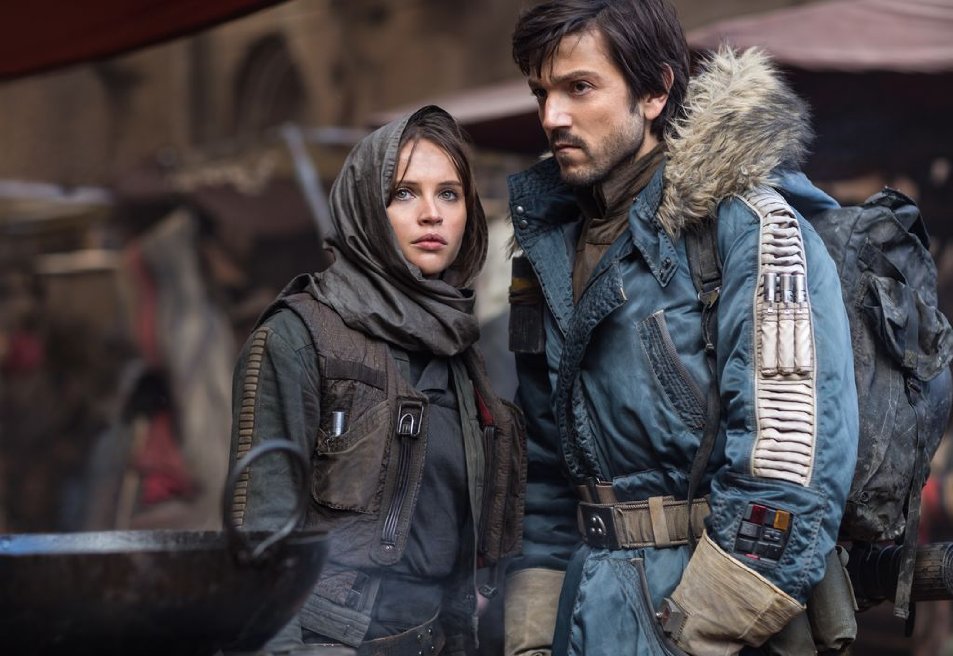 As the movie opens, the Rebel Alliance is gaining strength but the Empire’s final solution is being brought on-line. The Death Star, now fully operational, is moving around the galaxy turning cities into rubble and reducing rebel strongholds to ash. As the creator of the Death Star, the Robert Oppenheimer-inspired Galen Erso (Mads Mikkelsen), toils reluctantly for Director Krennic (Ben Mendelsohn), his daughter, Jyn, becomes a pawn for the Rebellion and joins cocky soldier Cassian and his droid K-2SO (Alan Tudyk) on a mission to locate and rescue (or assassinate) Galen. Along the way, after a meeting with famed freedom fighter Saw Gerrera (Forest Whitaker), they pick up stragglers Chirrut Imwe (Donnie Yen), a blind man with Force-derived powers; Baze Mulbus (Wen Jiang), a powerful fighter who defends his friend Chirrut; and Bodhi Rook (Riz Ahmed), a shuttle pilot who has defected from the Empire. With Vader and Tarkin breathing down his neck, Krennic pushes to finish the Death Star while rooting out a traitor in the engineering department.
As the movie opens, the Rebel Alliance is gaining strength but the Empire’s final solution is being brought on-line. The Death Star, now fully operational, is moving around the galaxy turning cities into rubble and reducing rebel strongholds to ash. As the creator of the Death Star, the Robert Oppenheimer-inspired Galen Erso (Mads Mikkelsen), toils reluctantly for Director Krennic (Ben Mendelsohn), his daughter, Jyn, becomes a pawn for the Rebellion and joins cocky soldier Cassian and his droid K-2SO (Alan Tudyk) on a mission to locate and rescue (or assassinate) Galen. Along the way, after a meeting with famed freedom fighter Saw Gerrera (Forest Whitaker), they pick up stragglers Chirrut Imwe (Donnie Yen), a blind man with Force-derived powers; Baze Mulbus (Wen Jiang), a powerful fighter who defends his friend Chirrut; and Bodhi Rook (Riz Ahmed), a shuttle pilot who has defected from the Empire. With Vader and Tarkin breathing down his neck, Krennic pushes to finish the Death Star while rooting out a traitor in the engineering department.
Although the feel of Rogue One is grittier than that of any of the previous Star Wars movies (except perhaps Revenge of the Sith), the film never loses its inherent optimism - “hope” is the refrain most often repeated by the characters. The downbeat tone is countered by moments of humor but it’s impossible to forget that, since none of the principals appear in the chronologically later films, it’s not likely they’re going to return wreathed in glory to Yavin IV. Instead, well, you can draw your own conclusions… The specter of death and the likelihood that not all will end well give Rogue One a sense of gravitas.
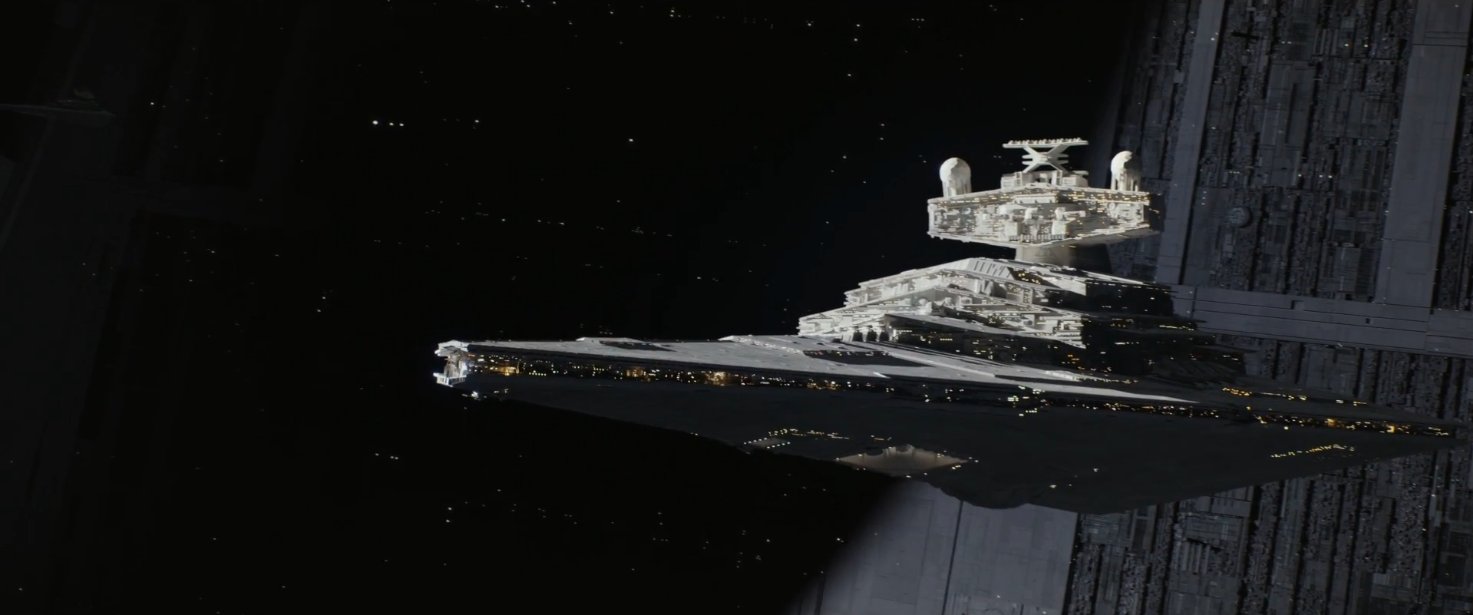 Edwards is careful to keep the special effects in check. The most notable sequences involve a full-on space battle in the skies above the planet Scarif. Although CGI was almost certainly used for these scenes, Edwards recreates the look of the Return of the Jedi dogfights and avoids the visually complex kaleidoscope of space carnage that Lucas realized in Revenge of the Sith. The ground battle scenes are pure war movie material - not front-line WW2 battles but Bridge on the River Kwai-inspired sabotage. The film’s pacing is uneven, however. The lengthy first half, which has the necessary task of gathering all the protagonists, has trouble gaining momentum. Only in the second half, with Vader making his first appearance and the action ramping up, does Rogue One shift into high gear.
Edwards is careful to keep the special effects in check. The most notable sequences involve a full-on space battle in the skies above the planet Scarif. Although CGI was almost certainly used for these scenes, Edwards recreates the look of the Return of the Jedi dogfights and avoids the visually complex kaleidoscope of space carnage that Lucas realized in Revenge of the Sith. The ground battle scenes are pure war movie material - not front-line WW2 battles but Bridge on the River Kwai-inspired sabotage. The film’s pacing is uneven, however. The lengthy first half, which has the necessary task of gathering all the protagonists, has trouble gaining momentum. Only in the second half, with Vader making his first appearance and the action ramping up, does Rogue One shift into high gear.
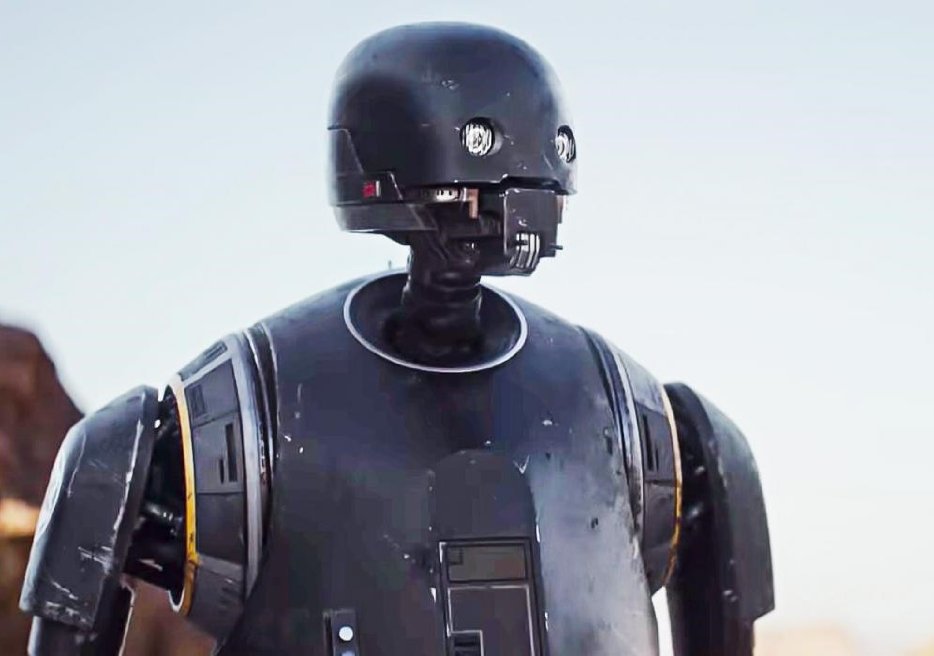 Rogue One gives us a couple of memorable additions to the Star Wars rogues gallery. Jyn, like Rey and Leia, offers another strong female role model; she’s more in the mold of the former than the latter - unafraid to get down in the mud and do the dirty work herself. She’s well-matched with Cassian, a Han Solo-type with a darker sense of humor and a few more ghosts in the closet. (And, unlike Han, he’s a gung-ho patriot, not a mercenary.) K-2SO is the latest Star Wars droid. Although initially amusing, his snarky demeanor can become grating after a while. One can only assume he was unduly influenced by a certain raccoon in Guardians of the Galaxy. Most of the other newcomers - the unimpressive Krennic and the underused quartet of Gerrera, Chirrut, Baze, and Bodhi - are at best second-tier Star Wars personalities.
Rogue One gives us a couple of memorable additions to the Star Wars rogues gallery. Jyn, like Rey and Leia, offers another strong female role model; she’s more in the mold of the former than the latter - unafraid to get down in the mud and do the dirty work herself. She’s well-matched with Cassian, a Han Solo-type with a darker sense of humor and a few more ghosts in the closet. (And, unlike Han, he’s a gung-ho patriot, not a mercenary.) K-2SO is the latest Star Wars droid. Although initially amusing, his snarky demeanor can become grating after a while. One can only assume he was unduly influenced by a certain raccoon in Guardians of the Galaxy. Most of the other newcomers - the unimpressive Krennic and the underused quartet of Gerrera, Chirrut, Baze, and Bodhi - are at best second-tier Star Wars personalities.
No discussion of Rogue One would be complete without mentioning how incoming composer (and likely heir apparent) Michael Giacchino handles the music. His work here is better than his contributions to the Star Trek films and a huge step-up from Doctor Strange but it could be argued that his source material is stronger. Like Ken Thorne with Superman II, he makes copious use of Williams’ original themes (most extracted from A New Hope, although he also uses The Empire Strikes Back's “The Imperial March”). When it comes to remixing Williams’ cues, Giacchino is at the top of his game. His original contributions aren’t as impressive. Strangely, he waits until the end credits to give us the full Star Wars theme (something he also did with the Star Trek movies).
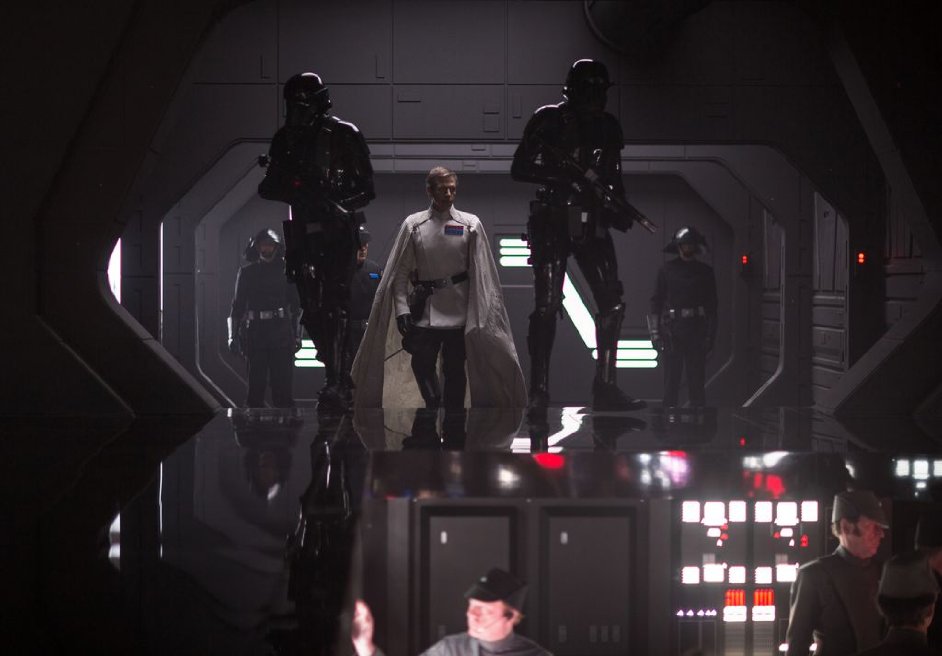 For long-time fans (and perhaps more than a few newcomers), the best moments in Rogue One are the references to the original six films, with most of those being direct call-backs to A New Hope. There are a lot of so-called Easter Eggs - some subtle, some obvious. Since many are designed as surprises, I won’t mention them here but you don’t have to look too hard to spot the best of them. The way in which the closing moments of Rogue One splice with the opening moments of A New Hope are perfect.
For long-time fans (and perhaps more than a few newcomers), the best moments in Rogue One are the references to the original six films, with most of those being direct call-backs to A New Hope. There are a lot of so-called Easter Eggs - some subtle, some obvious. Since many are designed as surprises, I won’t mention them here but you don’t have to look too hard to spot the best of them. The way in which the closing moments of Rogue One splice with the opening moments of A New Hope are perfect.
Many may view Rogue One as a stopgap between The Force Awakens and the as-yet unnamed Episode VIII. It’s a way to keep Star Wars front-and-center in a pop culture whirlwind that spins at an alarming speed. Darth Vader and the Death Star provide the iconic fuel for a well-oiled marketing machine. But Rogue One is a better movie than The Force Awakens - something that elevates it considerably over its “secondary” designation. It was always one of 2016’s most anticipated films and it doesn’t let down the legions who have been waiting for it.
Rogue One: A Star Wars Story (United States, 2016)
Cast: Felicity Jones, Peter Cushing, Jimmy Smits, Mads Mikkelsen, Riz Ahmed, Forest Whitaker, Wen Jiang, Donnie Yen, Alan Tudyk, Ben Mendelsohn, Diego Luna, James Earl Jones
Screenplay: Chris Weitz and Tony Gilroy from a story by John Knoll and Gary Whitta, based on characters created by George Lucas
Cinematography: Greig Fraser
Music: Michael Giacchino, John Williams
U.S. Distributor: Walt Disney Pictures
U.S. Release Date: 2016-12-16
MPAA Rating: "PG-13" (Violence)
Genre: Science Fiction/Adventure
Subtitles: none
Theatrical Aspect Ratio: 2.35:1
- Star Wars: A New Hope (1977)
- Star Wars IV: A New Hope (1977)
- (There are no more better movies of Peter Cushing)
- (There are no more worst movies of Peter Cushing)
- Star Wars: Revenge of the Sith (2005)
- Star Wars Episode III: Revenge of the Sith (2005)
- My Family (1995)
- Jane Austen Book Club, The (2007)
- (There are no more worst movies of Jimmy Smits)
Comments